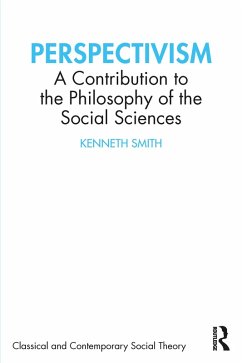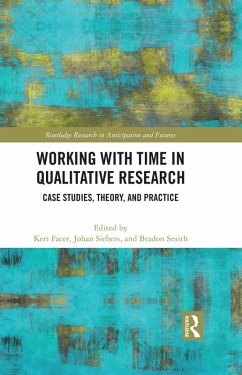
Paradox (eBook, ePUB)
Towards a Metatheory
Versandkostenfrei!
Sofort per Download lieferbar
39,95 €
inkl. MwSt.
Weitere Ausgaben:

PAYBACK Punkte
20 °P sammeln!
History reveals countless attempts by great minds to solve life's paradoxes. But what if these attempts miss the point? What if paradox is life?Contrary to the supposedly sublime linear logic that underpins our prevalent modes of theoretical and empirical enquiry, in this fascinating book, organizational anthropologist Tom Vine charts the pervasiveness of paradox across the academy: from arithmetic to zoology. In so doing, he reflects on the concept of paradox as a widespread existential 'pattern', a pattern which holds significant metatheoretical and pedagogical potential. Paradoxes, he argue...
History reveals countless attempts by great minds to solve life's paradoxes. But what if these attempts miss the point? What if paradox is life?
Contrary to the supposedly sublime linear logic that underpins our prevalent modes of theoretical and empirical enquiry, in this fascinating book, organizational anthropologist Tom Vine charts the pervasiveness of paradox across the academy: from arithmetic to zoology. In so doing, he reflects on the concept of paradox as a widespread existential 'pattern', a pattern which holds significant metatheoretical and pedagogical potential. Paradoxes, he argues, are not inconveniences or 'fault lines in our common-sense world' but are coded into our very existence. Paradoxes thus present their own vital logics that shape our lives: they thwart moral and ideological uniformity; they even out subjective experience between 'the haves' and 'the have nots'; and they shed light on the opaque concepts of consciousness and agency.
This book will appeal to anybody with a curious mind, particularly scholars and students with an interest in one or more of the following: complexity theory, critical pedagogies, ethnography, nonlinear dynamics, organization theory, and systems theory.
Contrary to the supposedly sublime linear logic that underpins our prevalent modes of theoretical and empirical enquiry, in this fascinating book, organizational anthropologist Tom Vine charts the pervasiveness of paradox across the academy: from arithmetic to zoology. In so doing, he reflects on the concept of paradox as a widespread existential 'pattern', a pattern which holds significant metatheoretical and pedagogical potential. Paradoxes, he argues, are not inconveniences or 'fault lines in our common-sense world' but are coded into our very existence. Paradoxes thus present their own vital logics that shape our lives: they thwart moral and ideological uniformity; they even out subjective experience between 'the haves' and 'the have nots'; and they shed light on the opaque concepts of consciousness and agency.
This book will appeal to anybody with a curious mind, particularly scholars and students with an interest in one or more of the following: complexity theory, critical pedagogies, ethnography, nonlinear dynamics, organization theory, and systems theory.
Dieser Download kann aus rechtlichen Gründen nur mit Rechnungsadresse in A, B, BG, CY, CZ, D, DK, EW, E, FIN, F, GR, HR, H, IRL, I, LT, L, LR, M, NL, PL, P, R, S, SLO, SK ausgeliefert werden.













